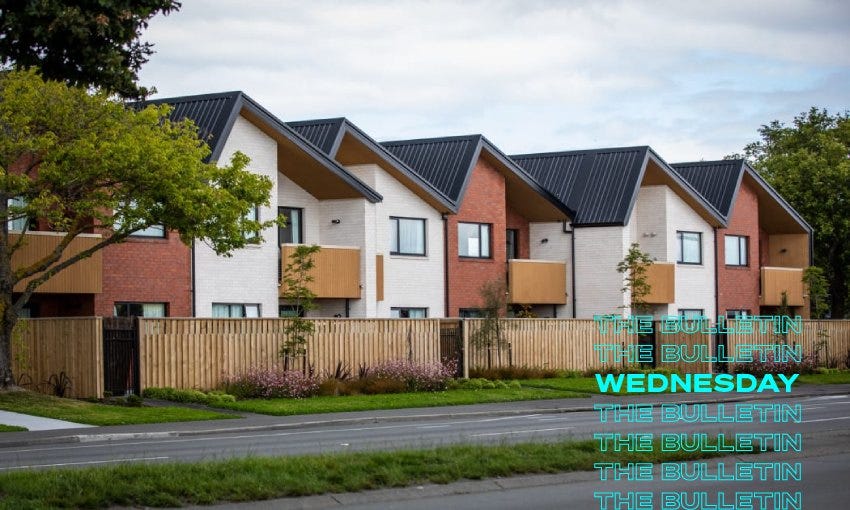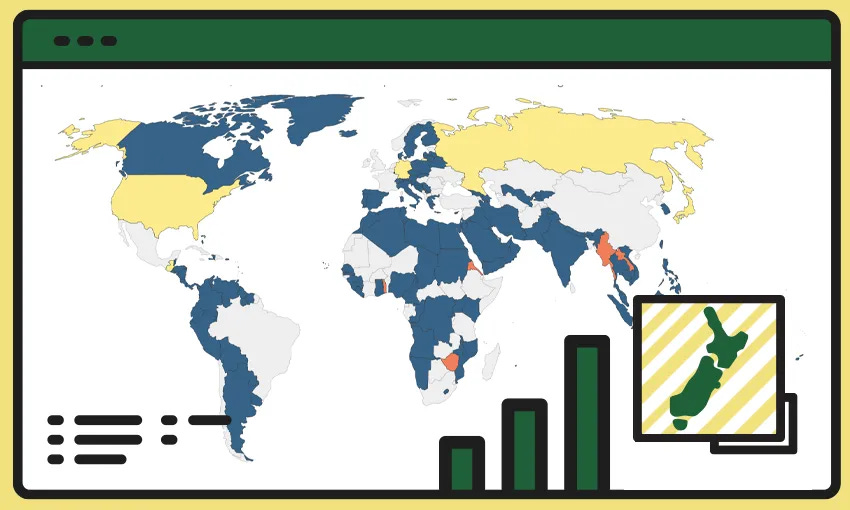The battle between local and central government
With a laundry list of critical issues like water infrastructure and housing to address, consensus between local and central government seems like a pipe dream.
Mōrena and welcome to The Bulletin for Wednesday, September 21, by Anna Rawhiti-Connell. Presented in partnership with Z Energy.
In today’s edition: UN Secretary General calls for windfall taxes; low crime numbers don't paint full picture; the minister of health won’t say the word ‘fat’, but first, local government pushes back.
Housing in Christchurch - the latest battleground in the fight between central and local government (Photo: RNZ/Nate McKinnon)
Relationship between local and central government critical
In a recent piece from the Herald’s Simon Wilson (paywalled), he lists questions he wants to ask Auckland mayoral candidate Wayne Brown. One of those is how Brown proposes to work with central government, citing Brown’s failure to get government on board with a review of the future of the port in Auckland in 2018. As we know, the future of the port remains undecided. Wilson’s question is important in the present day context of the mayoral race in Auckland but it’s also demonstrative of how important that relationship is for the sake of getting anything done in New Zealand, whether it be initiated by local or central government.
Three quarters of mayoral candidates don’t think Three Waters is right way forward
Right now, the relationship doesn't seem to be in the best shape. Results of a Local Democracy Reporting survey yesterday found 75.3% of mayoral candidates don’t think the Three Waters reforms are the best way to achieve the investment that is sorely needed in water infrastructure. Both the Auckland and Christchurch councils are pushing back on housing density rules. The Detail covered this issue well yesterday. What a time to be alive when someone is describing “people on the sidelines with popcorn" in the battle between the government and Christchurch city council. The Act party leader and deputy leader are headed to Christchurch to get amongst it, with a public meeting on the issue planned for Thursday. Government says it's willing to chat options. In his newsletter for subscribers yesterday morning, Bernard Hickey indicates there are signs the bipartisan densification pact may be softened.
Calls to clarify what power council has following statement on productive land
In 2019/2020, total revenue for councils in New Zealand was $13.9b. For the government that same year it was $116b. The government has far greater spending power than councils and you can see the appeal of centralisation and reform driven from Wellington as infrastructure deficits grow and costs rise. On the other hand, criticism about decision-making in Wellington and its distance from parts of New Zealand is valid. Recent government moves to protect productive land from housing development have been met by calls to clarify exactly what power council has in Auckland. You have to wonder why that wasn’t clarified with councils prior to the statement being put out.
Shuffle between central and local government stymies progress
Hickey has also summed up what he thinks is magical thinking from the government on that particular issue. His exasperation is palpable. The constant shuffle between central and local government stymies progress in a country as small as New Zealand. It’s almost unavoidable that local issues get framed through the lens of battles about big national issues here but according to this from the London School of Economics, that’s not necessarily good for how people feel about local democracy. In my area, all local election billboards are being defaced, but the ones with clear government association seem to be suffering from more regular attempts to poke out the candidates’ eyes. That can not be a good sign for local candidates or central government, or indeed anyone hoping for an aligned vision on how we might tackle our biggest challenges.
Shifting your power usage can help the planet
If you want to make a real difference to the environment and support the green energy transition, one easy change to make is shifting power usage away from peak periods. With Electric Kiwi’s MoveMaster plan, you’ll get cheaper off-peak rates, half price overnights and the famous Electric Kiwi free hour of off-peak power every day, so you have everything you need to switch more power usage to off-peak times when you’re more likely to be using energy generated from renewables. Find out more about how you can save with MoveMaster, now. (Sponsored)
Call from UN to tax fossil fuel companies “probably not intended for countries like New Zealand”
UN Secretary-General António Guterres has opened the 77th General Assembly with a very grim speech. His first words were: “Our world is in big trouble.”Guterres focused on climate change and said that “polluters must pay”, urging countries to tax the windfall profits of fossil fuel companies. He also said “the international community is not ready or willing to tackle the big dramatic challenges of our age”. Prime minister Jacinda Ardern is now in New York and was on the floor for the speech. As the Herald’s Thomas Coughlan reports, Ardern was less keen on the idea of windfall taxes, saying that those words were probably not intended for countries like New Zealand. The UK has announced a windfall tax on energy firms and the EU has also announced a proposal to do the same.
Low crime numbers impacted by pandemic
Stats NZ released crime statistics yesterday for the 2021/2022 financial year. They show a record low number of charges laid and a decrease in convictions for both adults and young people. Justice minister Kiritapu Allan wants to dig into the numbers saying they don’t paint the whole picture and that lockdowns impacted the numbers. Lockdowns and other Covid restrictions have caused almost 150,000 court appearances to be delayed during the pandemic. Allan admitted certain communities around the country don't feel as safe as the stats may perhaps illustrate.
The minister of health won’t say the word ‘fat’
I’ve done some walking in the old “explaining obesity” shoes. It is tiring. It’s also something we have to get a lot more comfortable talking about and that starts with accepting some realities. In the latest episode of Alice Snedden’s Bad News, Snedden tackles health minister Andrew Little on fat stigma. Little really struggles to admit it exists or even use the world “fat”. As Madeleine Chapman writes, Snedden suggests to Little that trepidation about talking openly about issues like this “or even to use terms like fatness” leads to dragging feet on changes from the government around things like the cost of food and socio-economic factors impacting neighbourhood food options. Watch the latest episode here or below.
Click and collect
Collective profits for the banking sector were $1.73b for the three months ended June.
Only $300 collected out of more than $400,000 in fines issued for Covid rule breaches.
Labour considering axing election walkabout over concerns for MP’s safety.
South Canterbury will get their standalone anniversary day.
Minor volcanic unrest raises alert level for Lake Taupō for the first time.
Got some feedback about The Bulletin, or anything in the news? Get in touch with me at thebulletin@thespinoff.co.nz.
If you liked what you read today, share The Bulletin with friends, family and colleagues.
Duncan Greive and Ben Gracewood checked the health and economic data to produce eight charts that show how NZ did over the whole pandemic against the USA, UK, Australia and more. Emma Vitz looks at how influential the controversial ratepayer votes actually are on local elections. Stewart Sowman-Lund hears Marcus Lush's plan for Invercargill and why he's not a "celebrity mayor". Susan Paris makes a compelling case for publishing more weird, original, beautiful books for kids.
Worsening eyesight is a national security concern in China
The long read is from The Atlantic today and is on why so many kids need glasses now. In East and Southeast Asia the proportion of teenagers and young adults with myopia has jumped from roughly a quarter to more than 80% in 50 years. In China, the military is worried about recruiting enough sharp-eyed pilots from among the country’s 1.4 billion people.











